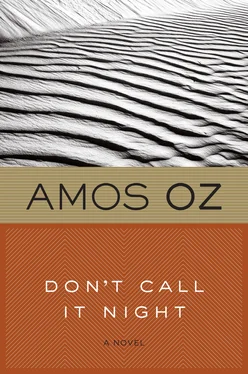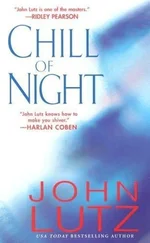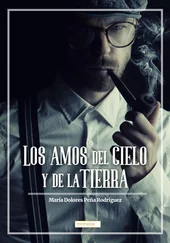We got to Tel Aviv in July, during a suffocating week-long heat wave. The steamy city repelled me at first glance. After ten years away it looked more ugly than ever: a mess of grimy suburbs with no centre. Wars, rhetoric, greed, punctuated by raucous fun and the same sweaty mixture of destiny, arrogance and despair. We rented a furnished two-room apartment on Prague Street, behind the central bus garage, and began to settle in. In the late afternoons we went out for long walks along the seashore. In the evenings we tried out restaurants. Then in August she went on a one-day tour of the Negev for teachers and when she got back that evening she said, Let's go and live in Tel Kedar, it's the end of the world, the desert is like an ocean and everything's wide open. Are you coming?
I hesitated for the best part of a week. I remembered Tel Kedar from before the town existed. I'd worked there for a few weeks in the late sixties, in a barbed-wire encampment of tents that was visited once a day by an army tanker that brought us water and the newspapers from Beersheba. For three weeks I roamed all over that bare plateau roasting in the sun at the foot of the cliff from before dawn to after dusk. At night by the light of a pressure lamp I sat in the administration tent sketching rough preliminary ideas for a master plan that was intended to get away from the usual Israeli approach and create a compact desert town, sheltering itself in its own shade, inspired by photographs of Saharan townships in North Africa. Nimrod Finkel looked at the sketches and shrugged his shoulders, Same old Theo, carried away by his fantasies, it's brilliant, it's original, creative, the trouble is, as usual you've left one factor out of account: when all's said and done, Israelis want to live in the Israeli style. Desert or no desert. Just you tell me, Theo, who do you imagine suddenly wants to be transported back to North Africa? The Poles? The Romanians? Or the Moroccans? The Moroccans least of all. And just remember this, chum: this isn't going to be an artists' colony.
That was more or less the end of my contribution to the construction of the desert town of Tel Kedar. I had never experienced the slightest urge to go back and see how it had turned out. I imagined they had built row upon row of identical prefabs with a first floor held up by bare concrete pillars and with sliding shutters on the balconies. They'd have fixed all sorts of notices to the concrete pillars, and mailboxes, and receptacles for collecting old newspapers for the Soldiers' Support Committee. And rows of trash cans in rectilinear containers in front of each building.
By the end of the week I said to Noa, All right, why not, let's give it a try. Something inside me responded and wanted to follow her to the desert. Or anywhere. I transferred half my savings from the bank in Toronto, put part of it in index-linked government bonds and part of it in shares and pension plans, bought this apartment, and purchased the property in Herzliyya that brings in a thousand dollars a month. Noa immediately got a job teaching literature in the secondary school. I opened a small planning office. Seven years have passed and we're still here, like a couple that's come through the child-rearing wars and is living in a quiet routine, looking after the houseplants to pass the time between visits from the grandchildren. We've furnished the living room with a white three-piece suite and matching rug. Noa usually invites a few people over on Friday nights, some teachers with their professional army-officer husbands, the local choirmaster, a couple my age from Holland who are both doctors, a hydraulic engineer, a neo-cubist vegan artist who objects to leather shoes, a drama instructor. We talk about national security and the Occupied Territories. Joke about government ministers. Deplore the way the town has stopped growing, the better residents are leaving and are being replaced by people who are only so-so. Perhaps the immigration from Russia will give us a bit of a boost. Though in point of fact, what will they do here? They'll dry out in the sun like us. Noa serves fruit and biscuits and South American coffee that makes your head spin, concocted with spells and brandy. If one of the speakers pauses, hesitating, searching for the right word, Noa has a habit of jumping straight into the gap, volunteering to finish his interrupted sentence, produce the missing word or free an idea that had got stuck. Not as though she is dominating the conversation but like an usherette whose job is to stand at a particular spot and gently take any latecomers by the elbow to make sure they do not stumble in the dark on some unseen step.
As the evening wears on the conversation breaks up into groups: the men discuss the issue of the deterioration of standards in public life, while the women exchange their impressions of a new play or novel that is causing controversy in the newspapers. Occasionally they come together again around scandals in artistic circles in Tel Aviv or a recent television broadcast, and there may even be a few local affairs, generally thanks to Muki Peleg. The artist may say, for instance: A couple of days ago I went to see an exhibition of young minimalists in Rishon Le-Zion, followed by a display of contemporary multimedia. Art is galloping ahead, culture is booming, and all we do is sit here slowly evaporating in the sun. There's a charming pedestrianized street now in Rishon Le-Zion with galleries, artists' clubs, restaurants, and the other streets are brightly lighted and full of life, people come back at midnight from a night out in Tel Aviv and fill the cafés and talk about new directions in the theatre, here all we can do is have a game of backgammon, watch TV and go to bed with the birds. The aerobics teacher says: If only they'd link us up to the cable television, like everyone else. And her husband, the lieutenant-colonel, adds bitterly: You can be sure of one thing, darling, that those settlers in the territories will get cable TV long before us, we're at the back of the queue as far as they're concerned, if we're in it at all. Noa says: We could bring that display here too. We could rig up some spotlights and turn the corridor of Founders' House into an art gallery. And why shouldn't we invite an art historian from Beersheba occasionally to give a lecture?
As for me, I go round the room serving the drinks in a gesture of democratic politeness, emptying the ashtrays, offering the occasional anecdote from the Caribbean islands or an example of Indian humour. Most of the time I just sit and listen. Trying to guess what sort of judgment Noa will pronounce after the guests have left: good or bad, hot or cold, desperate. And it's she who says to me, You're such a summer-up. Don't sum up, just watch.
At midnight or twelve thirty the guests disperse, promising that we'll meet again next Friday. Noa and I clear away and wash up and then sit down for another half an hour or so over a glass of mulled wine in winter or iced coffee in the summer. Her blonde hair masks half her face from me, but her printed dress leaves her shoulders bare and they are delicate and fragile like leaves turning brown in the autumn, in places where they have autumn. At moments like these, when we are exchanging views about the acquaintances who have left, I still have an urge to take a shawl and cover her shoulders that are punctuated with a tiny brown birthmark near her soft nape. I start to woo her in my usual way, that enjoys waiting. Drawn by the scent of honeysuckle. Sometimes we go on talking till half past two at the kitchen table about the wonderful sights we used to go and see at weekends in the Cordillera del litoral. Until Noa interrupts me in mid-sentence and says, That's enough talking, let's make love, and then she undoes my belt and undresses us both and lays her head in the hollow of my shoulder and puts my fingers to her lips. Our life is quiet and steady. The sitting-room rug is white and the armchairs are light-coloured too. Between them is a black metal standard lamp. There are houseplants in the corner. We have separate bedrooms because it turned out that we sleep differently.
Читать дальше












